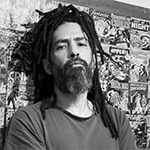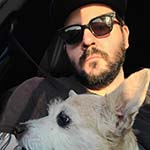Erline
Here is the place. The silent young couple at the table, postures guarded. The mother, tall and gaunt, looming like a specter in corners and breathing down their necks. The cluttered half of the kitchen table that has long been relegated to disuse, piled with coupon books and mugs and the lumps of carefully-wrapped half-sucked lozenges and abandoned knitting and dust-clogged locks of baby hair and a purple smear of jam, attracting ants. The dog wedged beneath the coffee table, obsessively licking a spot on the rug where a piece of pork belly was dropped years before, when she was a long-eared puppy and was treated gently. The children who play quietly, nervously on the rug, setting down their plastic blocks with great precision, making no noise.
The young woman at the table, pressing her husband’s shoe with her toes, eyes unfocused. She never meant to be an angry sort of woman. And yet, there are times these days – too frequent for comfort – when she comes to from some unknown place, finds herself shouting at the children, hitting the dog. She assures herself that it isn’t her, not the real Annie, not really. But it is beginning to filter down, the realization like points of drizzle which slide slow and indirect through the sweetgum canopy, that what she is might be related to what she does.
Round the corner and down the dim, narrow hall, a closed bedroom door. Behind it, the old man in the small wrought-iron bed – Annie’s childhood bed – quiet, awake, breathing slowly, eyes unmoving from a patch of textured plaster. All the trappings of the teenaged girl’s room – the ballerina jewelry box, the few stuffed animals on the armoire, ragged from long use, the glossy cutouts of black-haired boys tacked to the violently orange walls, paper skin faded to corpse-blue from long exposure to the sun, all turned macabre in relief against the sunken old man, semi-paralyzed since his stroke. His spectral wife disdained the Medicare home-nurses but lacked the affection for real care, leaving him to sit in his piss and his bedsores when no one was around to see. The commitment to their marriage strong, ironclad, devoted as they are to their decades-long game of getting-back, the cycles of punishment and retribution, circling around the heart of their mutual hatred, outside of which there is little self-identification, the only thing that gives any real pleasure.
The little family – husband, wife, children and dog – is back in Annie’s hometown, crammed in the house for ten days, called there to help the mother in caring for her husband after the stroke. Though since they have arrived she has rebuffed any real offers of help, instead cornering them at the long table and talking ceaselessly (long-suffering, demanding praise) all while the door to the sickroom is closed tight, keeping in the stale, April-moist air. The young husband sits across the table, distractedly peeling an orange, nails a bit too long, the white pulp lodging underneath in pale crescents. Little things, tiny things, setting the ends of Annie’s nerves crackling like sparklers. His ability to sit quietly without expression, the experience alien to the women in the room – they sense his mind like a glass of still water, colorless, their reactions ranging from jealousy to anger. But internally he is anything but tranquil, his muscles carefully rigid, sheathing his bones, controlling the tremors. He eats and drinks endlessly, glass after glass of sickly-sweet iced tea, filling his mouth with something other than conversation. Every thirty minutes he excuses himself to the small, mildewed bathroom with its potpourri and framed bible verses, and stares at himself blankly in the mirror, taking five deep breaths before flushing, wading back into the solid air. The old woman scares him more than he would like to admit. It’s not the grey face, the heavy crucifix bouncing on skin-draped clavicles, rather it’s the features that so resemble his wife’s, and the expressions of animal rage that flash across the women’s faces when they speak to each other. In four days, he has only made eye contact with the mother once, accidentally.
Annie has been doing this more often lately, bursting out of the house without warning. She omits explanations, retains some dignity.
She drives in silence along the too-familiar roads. Each turn, each patch of switchgrass and algae-slicked cypress submerging her into some prepubescent memory. She misses her grey expanse of Baltimore, the scenes crafted by human intention. Back here in the place of her youth the landscape is oppressively fecund, stems tumescent with water, the wet spring air over-thick with swamp-scent, her windshield smeared with yellow insect gore after a few slow miles. There are few safe, neutral places in this town. There are no bars, no cafes that feel like moving into this highway-side tumble of houses with only one flashing stoplight. So, she drives towards the grocery store while the grey clouds gather for the morning rumble of rain. The drops are hot as blood, steaming off the asphalt as she walks through the parking lot. She slips herself damply into the white, humming aisles. There is color enough, words and texture and smell enough here to occupy her for hours. She strolls gently, loitering, palpating an avocado, fingering a packet of sunflower seeds.
Annie rounds a corner and sees her. Her hair is a home-dyed jet black, with lighter roots creeping in along her part, making it look as though she is balding. A small boy has chubby arms clamped around her leg, whining gently, like an engine in winter. The woman drops a packet of cereal into her basket but remains standing, apparently transfixed at the boxes in front of her. The small boy gives a wail, and she slaps his hand. Two pairs of eyes flicker up and maybe, maybe, meet.
*
She found Erline when they were eight years old. Annie big and awkward for her age, with hair that frizzed and shoulders hunched permanently in an effort to conceal the budding of young breasts. Her asthma, mild but self-emphasized in disinclination for group sports, was her excuse to spend recess periods in the library, reading novels under the long-stemmed ceiling fans, doted on by the spinster librarian.
Troublemakers would sometimes join her for stints, the length of their detention depending on the severity of their transgressions. Erline came in February, her confinement due to last until summer break, because she had hit Jodie Bryant so hard in the mouth that one of her front teeth had fallen out.
“It was just a baby tooth,” she whispered to Annie, unprompted, before the librarian told her to hush.
Through Annie’s child’s eyes, she cut a figure of gross intimidation, her knuckles and knees ragged with peeling scabs, leaning her chair back on two legs.
“I don’t like Jodie Bryant,” she mouthed behind the cover of her book, amazed at her own daring.
She had not learned yet, awkward and socially immature as she was, that sometimes all that is needed to create a bond is a common enemy. Erline’s teeth pointed every which way, but Annie noticed she didn’t smile tight-lipped like the other girls with bad teeth. She smiled with her whole mouth, with her whole face.
Annie began spending regular afternoons at Erline’s place, while her mother finished long shifts at the restaurant. Her mother begrudged these visits, preferring Annie to stay home alone with her schoolwork, but was overruled by her husband, the casual finality of the paterfamilias. He drove trucks cross-country and was most often gone. But when he was home, he treasured his position as the yielding parent – that though he gave so little of his effort, he was Annie’s favorite, and at the time, she felt these allowances more than made up for his casual neglect.
Annie’s parents’ home was a small bungalow, the inside clean as a surgical theater, and so quiet that at night when Annie lay under her quilt with her eyes closed, sleepless, unmoving in case her mother came by to check on her (the bedroom door had been removed the year before, when Annie’s mother had pried open the lock on her diary and read her daughter’s words that were uncouched and unguided by her own opinions and sensibilities, and had determined that this child – this child that she had had for herself, brought into the world to love her, and reflect her – had turned out rotten), the silence pressed into her ears like static pressure, broken only by the chirping of the Carolina peepers.
Erline’s place was better. The double-wide was packed with upholstered furniture that her mother kept covered in a thick, clear plastic. The yard was dirt, or mud in the springtime, and dogs and chickens and ducks were perpetually underfoot, taking dirt baths in the shade under the trucks on blocks. The sleepy grandfather in his chair by the sprawling garden, shaded by the green leather of magnolia leaves, his .17 stretched over his knees (on watch for groundhogs), a cooler by his hip, the warm drift of his winter years. Erline’s mother barefoot in the garden, flax-haired, sunburned, her pretty smile with the one winking gold molar. The TV and the radio were always on, turning the clearing lively – as Annie imagined it, untraveled, mind stuffed with fat novels – as a Moroccan souk, a South African bazaar.
On a boiling day that spring, soon after they became friends, the girls decided to go gator hunting. Never mind that no one in Pasquotank County had seen a gator in decades – they believed in the creatures only to the point which gave pleasure and no fear, the thrill in the daring, the secrecy, the sucking of the peat bogs, the black-red cypress water that splashed over the lip of the tallest rain boot. They squatted in the shade of a sour-smelling dogwood, attempting to whittle the ends of long sticks into spear-points, Erline rhythmically swinging her long, lank blonde hair to keep away the greenheads.
Annie heard bootsteps and turned to see Erline’s father approaching, his concave chest mirror-slick in the heat. She stood up and backed away quickly, body shocked as though with electricity at the thought of oncoming punishment, patting her pockets for her inhaler.
But the man picked up her abandoned spear with a crow of laughter.
“Now what the hell is this supposed to be?” he asked.
“We’re going gator hunting!” chirped Erline. Her thin limbs glowed milk-white in the springtime sunshine.
“Hmmm,” he said, and rolled the stick between his fingers, “hold on a minute then.”
They trailed him behind the shed, shooing away chickens and the dogs’ curious, wet noses. His machete flayed away the green wood easily and he handed back the newly-sharp spears, real interest in his long-nosed freckled face.
“Go on and catch me a big one,” he said.
When her mother came that afternoon, Annie could tell she was in a black mood. She stood in the open door of her car in her tuxedo shirt, yellowed at the armpits, flyaways tumbling out of her tight bun, the evening thunderstorm crackling behind her, encroaching from the southern horizon.
“You’re filthy, what have you been doing?” she said.
“I’m sorry,” said Annie.
Erline came up behind her.
“Hi, miss Janice.”
Annie looked at Erline. The girl had a softly weeping cut down her arm from playing with the dog, her cutoff shorts too small and fraying along the pocket seams, her smile huge and full of teeth. The mother smiled, but it was amazing how feckless such a gesture could be. She bundled Annie in the car without saying anything. As they drove away, Erline’s smile faltered, and broke.
Days later, the girls were laying belly-down on the bank of the creek, hands trailing along the pebbles crusted with algae, soft mud dimpled by the tracks of lizards, the minute feet of palmetto bugs. Without preamble, Erline spoke.
“Why doesn’t your mama like me?”
Annie splayed her fingers in the hot slick of the mud, like oil under her palms, unaffected, using the unabashed candor of a child who has been nowhere, who has known no one.
“She says you’re white trash.”
“What does that mean?” said Erline.
“I don’t really know,” said Annie, “but I’m not.”
“Why?”
“Because we eat lots of vegetables, and we don’t have a TV.”
Erline nodded, then waggled her hands in the shallow creek water, causing several fat toads to hop onto the opposite bank.
“I don’t like vegetables,” she said.
While Erline was tough, brash, and confident – those traits that generally wrought popularity and acceptance – there was something about her a little too rawboned, a little too cutting, for the other children. Annie had thought she would have to fight for Erline’s affection (her manner was to be subservient to other children as she was to her parents, she would demand her playmate’s favorite color before naming it as her own as well, always the same, always attempting to match, her obvious desperation precluding the result), but Erline was alone too. Two only children, a strange pair, tall to short, round to bony, nervous to bold, but the match was a good one, allowing for the young life’s first bloom of interreliance.
It was Erline on the other end of the landline when Annie crawled into the back of the coat closet, curled phone cable protruding from beneath the door, whispering through quick breaths about the collapse of her family’s nucleus. Mother caught Father cheating with not one, but several women all along his truck route to Texas. The mother forbid Annie from leaving the family room while the parents fought – while the mother screamed at her husband with the windows open, causing the dog-walking neighbors to speed their steps, ripping open fifteen years’ worth of wounds. The mother had a grim triumph witnessing her daughter in the corner – Annie sitting on the sticky leather chair with her hands folded in her lap, staring hard at the opposite wall – while she shamed him, taking pleasure in his comeuppance, at the rescinding of his title of favorite parent. But the father knew, and Annie knew, there, with her sweating thighs glued to leather, that the title had staying power.
The mother stayed with the father without joy, gaining an air of self-sacrifice that she hoped would give her an air of godliness, a whiff of the forgiving Jesus, but which only led the neighbors to turn their heads from her (the southern ladies’ mixture of smiling pity and condescension), unable to look at her dark eyes, falsely wide, the damp desire for sympathy covering the grey iron of fury. She took over the guest bedroom as her own and flung herself further into the Church, having conversations with Jesus as though he were in the room with her, enrolling Annie in every bible study that she could find. As she grew more and more grim, she clung to her daughter all the harder. Many times throughout the following years she attempted to keep Annie from her friendship with Erline, this child’s dirtying influence on her daughter’s clean future. For the most part, Annie was a docile, pliant child, but she saved up her rages for those occasions and expelled them in tantrums that she believed – with satisfaction – inspired real fear in her mother.
They were fifteen when Erline’s mother died. She had seen a puppy on the roadside, half-submerged in ditch water, and swerved to the shoulder (she had always been a nice woman), brought it back home and wrapped it in baby blankets, poked mashed pumpkin into its mouth, wiped away the green mucous that bubbled from its tiny snout. But the dog died within a day, and Erline’s mama was dead within the month. Rabies, the kids at school said. So will you reap, thought Annie’s mother. Annie sat at the sticky lunch table alone for weeks, bereft of any other friends, chewing her celery to fibrous pulp. She remembered Erline as she had last seen her, out by the old firehouse with their purloined menthol Parliaments, Erline with her sparkly purple eyeshadow, plastic wrappings and cans whose dregs smelled hot and fierce in the sunlight, and Annie remembered thinking she had never seen anything as elegant in that moment, the girl’s eyes like twin bruises, garbage fluttering at her feet, the way her chest felt caved in with affection, scaring her. After, Annie had tried to sketch the scene, but she was no artist, and the attempt looked childish, and she tore the paper up into bits, angry that her own hands would flatten a moment so precious.
When Erline came back, after, there was a hardness to her. Annie tried to ask about her mama that first day, and Erline shouted at her, and so she never asked again. Erline was still small and skinny, nearly runty, but her face looked older, like a grown woman’s lopped head on a girl’s body. Years later, Annie will think of her in those days, standing on a chair, stiff-spined, stirring spaghetti in the stock pot. The five of them – grandparents, father, Erline, Annie –- sitting at the round table, all trying to act normal, all failing, the grandfather weeping at odd times, the father drinking and drinking to incoherence, and the grandmother forcing endless measured conversation with Annie, asking questions she knew the answer to, terrified of the silence. The stock pot with its remnants was placed on the floor for the dogs to fight over, and Daisy (the big female German shepherd) got the lion’s share, snapping at smaller ones, lapping noisily, flecks of red drool spotting the rug, while the grandmother shouted over the noise, asking Annie again and again – a ballerina? a marine biologist? a librarian? an astronaut? where will you go? (Annie had that look about her, unmistakable even then, of one who would not stick around.)
Their friendship, ’til then bowstring-tight, slackened. Erline found other friends, older friends, keen to be out of the house whenever she could manage it. She pierced her cheek like Marilyn Monroe. She began experimenting with taking lit matches to the insides of her elbows, the skin as pale and vulnerable as sweated cold cuts. Her father had lost any stabilizing influence, he was a man lovesick enough that he felt no more responsibility for his actions than of some man he glimpsed on the roadside, his grief reducing him to near-babyhood, jerking between his basest instincts, drinking heavily, going missing for days at a time, turning reckless when despair performed its practiced alchemy in creating anger.
A year after the death of Erline’s mother, Annie heard the familiar ripping sound of a motor, and behind the twitched curtain was Erline’s grandmother’s mustang, idling on the shoulder. The car honked twice (Erline never came inside). In the kitchen, two glasses of sweating sweet tea with lemon, the wobbling ceiling fan, the half-finished Scrabble game, and the mother frowning from her seat.
“You can go down and say hello, but you’re not getting in that car,” she said.
“Alright,” said Annie.
“You need to spend time with your family.”
Annie slipped down the driveway towards the low-slung car, loud even when motionless, and Erline kicked open the passenger side door.
“I can’t get in,” said Annie preemptively, “my mom said I have to stay here.”
Erline leaned way over the center console, straining at her seatbelt. With affected nonchalance, she allowed her right arm to drop onto the passenger seat, the white gauze bandage on her forearm glaring conspicuously in the noontime sun.
Annie got in the car. Erline accelerated so fast that the door slammed shut before Annie could do it herself. Annie looked into the back seat, where a case of beer was half open, leaking cans which jounced around the upholstered seats, a few partially-filled handles of liquor clacked together noisily with every pothole.
“What are we doing?” Annie asked.
“I’ll show you,” said Erline.
She drove out into the backwoods on the winding ribbon-roads, the bright air rippling over the blacktop, the car’s interior icy with air conditioning. The car kicked up a cloud of pale dust as she maneuvered onto the dirt road to the place they had shared bright moments, by the old firehouse, long abandoned in the center of a fallow field, the soil cracked with deep, thirsty fissures. Past the chain link, clogged with plastic scraps on the Eastern side from the relentless ocean wind, the old blue dumpster with its halo of buzzing insects, the muddy possum prints on its broken black lid. Erline parked the car and the girls emerged into the noonday heat. Intense cold feels like pain, but heat feels like pressure, and it bore down on their chests, constricting breath, curving the young shoulders forward. Erline dragged the thirty rack from the backseat and flung it onto the ground, metal cans bumping along the dry soil.
“Are we drinking these?” Annie said, half-excited, half-scared, toeing a can with her sandaled foot.
“No,” said Erline. She strode quickly to the dumpster, pinching her nose, and stood on tiptoe to flip back the heavy plastic lid. She sprinted back as the lid flapped over, slamming against the dumpster-back, the resulting explosion of flies from the impact. Erline picked up two cans and tossed one to Annie.
“You ready?” Erline asked, and Annie nodded, not knowing, not needing to know, grateful just to be asked along.
Erline got into a stance like a baseball pitcher, left leg tucked up to her chest, flip-flop dangling from her toes, the nails painted white, tiny as Tic Tacs. She hucked it with an almost-grunt, an almost-scream, like a tennis player at the end of a losing match. The can flew, tumbling, and hit the inside lip of the dumpster. It exploded, spraying white foam into the air. Erline whooped loudly, bouncing on her toes, arms in the air, face full of a hard kind of joy which made her seem old, which looked strangely close to indifference.
“You do one,” she said, and Annie threw. The impact of the can on the metal dumpster-wall sounded like a gong, a gunshot. They threw the rest, and then threw the glass bottles, the sound of shattering glass satiating, like an itch deeply scratched. When it was done, they stood panting, excited, the air smelling of yeast and sun-heated liquor and their own pubescent sweat.
“He’s quitting?” Annie asked. “Your dad?”
“He will be,” said Erline. “And there’s one more thing.”
She led Annie around to the back of the car, and jimmied the trunk open – inside, a black contractor’s bag. Annie pulled back the plastic to look inside and jumped back with a shriek, waving her hands, as though she had disturbed a snake’s nest.
“Don’t be a baby,” said Erline, widening the bag’s opening with her hands, exposing the contents – two long shotguns, the .17, several handguns, and a hulking semiautomatic thing with a complicated scope.
“Why do you have these?” whispered Annie, tiptoeing back near the trunk, as though the guns were some wild animal that might be frightened by her approach.
“They can’t be in the house right now,” she said, worrying her lip with the sharp tip of her pink tongue. “It’s not for forever, just right now.”
“What are you going to do with them?”
“Hide them,” said Erline. “For now.”
She reached behind the contractor bag and pulled out two short-handled shovels. She didn’t ask Annie, but there was no need – Annie was already reaching for the handle of the bigger one. They walked to the treeline and found twin pines, tall and parallel-straight. Between the trees they began to dig, the soil loose and sandy, easily disturbed. Even so, their shirts were dark with sweat by the time the hole was big enough.
They carried the guns over, holding the soft plastic of the bag with sweating fingertips, arms out straight, trotting and tripping along, eyes squinting and faces turned away. They placed the bag softly in the hole and smoothed handfuls of silty soil over the top. Standing up, they could have been mistaken for two old women, hunched, swaybacked. They were both filthy, ribbons of brown sweat flowing down their arms, armpits and finger joints turned to mud slicks, Erline’s bandage soiled brown with its splotch of percolating maroon. Erline used her pocketknife to mark one of the trees, gouging an X into the fibrous bark.
The light was failing, and the cicadas had begun to scream. The girls sprinted back to the car, cottonwood twig fingers grasping and trailing over their faces, tangling in their hair. At the car, they crashed together with no conscious thought on either side. Damp salted limbs gripped each other, the top of Erline’s head barely reaching Annie’s chin, her thudding heart reverberating through Annie’s stomach, and Erline showed the first bit of weakness yet, digging her black-chipped nails into the ditch of Annie’s spine. They broke apart, conscious that something significant had happened, was perhaps still happening, and Erline watched Annie’s blotched red skin, and Annie saw Erline’s sharp eyes, ringed by wilted sodden mascara tracks, and she felt the familiar hitch of breathless asthma, felt a strange sharp stab of unplaced shame.
Back outside Annie’s house, the car idling, the mother looming on the porch like an iron thunderhead, it was dark in earnest. They looked at each other, the whites of their eyes bright in the dash lights. Annie wanted to say something to her, do something, to let her know – but she didn’t know what. Something indefinable. Her hand reached out, then stopped. She wasn’t brave like Erline was. She got out of the car and walked slowly up the driveway.
The engine roared as the mother dragged Annie roughly inside.
“I thought you were dead,” she spat, “you could have been dead.”
“I wasn’t dead,” Annie said.
When the father got home from his route that night, stone tired, the mother had him fit the door back onto Annie’s door with the lock fitted backwards, only to be manipulated from the outside. The mother heard Annie’s weeping, pleading from inside, and was glad of it – she had been herself forged in fire, and it had turned her scrappy, thrifty, immune to pain. Children were done a disservice when coddled, they turned to jello-soft adults, and this confinement was the greatest gift she could give her only child.
At school, Annie waited for Erline, but the girl didn’t come back. Through the week, Annie sat as she was wont to at her solitary table, sliding her eyes along the pages of a novel, not taking in any meaning. She missed Erline as much as she had ever missed anything. On Friday she told her mother that she was going to have a sleepover with her lab partner, a plain, dumpy Christian girl who her mother liked very much. But she got off the bus at Erline’s.
They sat in the woods. Erline smoked cigarettes in earnest, idly picking ticks off the dogs. She looked vital, whip-like, her eyes grown to the size of cue balls.
“I don’t want to be here anymore,” she said.
“You should go to college with me,” Annie said, and Erline snorted.
That night they lay side by side in her bed, with Daisy stretched snoring along the foot. It was too hot to fall asleep, and Annie stared for an interminable time at Erline’s things, her dresser cluttered with bottles, her closet exploding with clothes, the posters papering the wall so thoroughly that almost none of the original paint was visible.
“Are you awake?” said Erline, and Annie realized that the silence had not been hers alone.
“Yeah.”
There was a crumple of sheets as Erline rose onto one elbow. The moonlight streamed through the blinds in parallel slats, and her face was beribboned with white light. One eye shone green and piercing, the other a dark pit.
At the same time, unbidden, they leaned into one another. Erline’s lips were thin and tasted like toothpaste. She pulled Annie on top of her, running her fingers along her body where they tickled like insects. Daisy grunted in annoyance and jumped off the bed. Annie felt hot, insane, her brain resounding with static. It was the best she had ever felt.
Erline slept, snuggled into Annie’s shoulder. But Annie did not. She watched the slats of moonlight creep up the wall, illuminating different planes of her posters in turn. When the illuminated hands of the clock reached 5:00 a.m., she moved slowly, slowly out of bed. She put on her shoes, and walked carefully out of the room, the carpet muffling the soft footsteps. As she closed the door she looked back. She thought she saw the wet glint of eyeball, but it was gone too quickly to be sure.
The phone rang twice, and her mother picked up, voice laced with panic.
“Hello?” she said, “what’s wrong?”
“Mom,” she whispered, and shivered in the dampness of the driveway, batting mosquitoes from her legs. “Will you come pick me up?”
Her mother took out a loan to send Annie to a private Christian school in Savannah, and she stayed in that city for nine years. It took her six years to get through college. Afterwards, she got a job in a lab. She met and married her husband in quick succession, and her mother cried with joy at the church wedding.
It has been nearly a decade since Annie last saw her, and here she stands. She walks through the aisle and stops behind her, runs her fingers, unseeing, along brightly colored boxes. She doesn’t acknowledge Erline, nor she her. But they linger back-to-back in the aisle, breathing the same air.
Nina King Sannes is a writer from the Great Dismal Swamp of North Carolina. She holds a Bachelor’s degree in agroecology from Cornell University and an MFA in fiction from the University of Illinois at Urbana-Champaign, and is currently pursuing a PhD in English from the University of Rhode Island. She is a winner of the AWP Intro Journals Award, and her work has previously appeared in EPOCH Magazine, The Colorado Review, The Broadkill Review, and Carolina Muse. She is the co-host of The Airport Fiction Podcast, available here: youtube.com/@Nina-King.



 BACK TO ISSUE
BACK TO ISSUE







